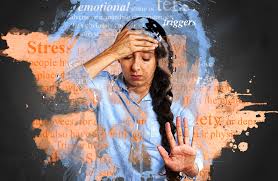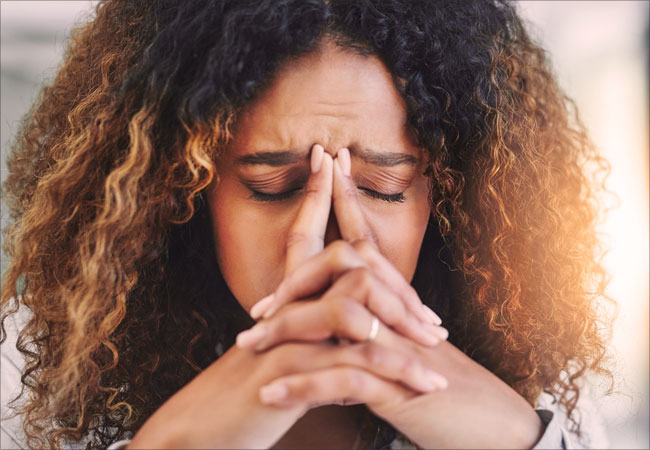Anxiety disorders are the most common mental illness in the United States, affecting 40 million adults in the US each year. While there are many different types of anxiety disorders, they all share one common symptom: excessive worry and fear. If you are struggling with anxiety, you are not alone. In this blog post, we will discuss 11 common causes of anxiety and some tips to prevent them.
Defining Anxiety
 Anxiety is described as “a feeling of worry, nervousness, or unease about something with an uncertain outcome.” It’s a type of stress that can be triggered by a variety of things, including work deadlines, family conflict, and relationship issues. This is considered a disorder when the anxiety is so strong that it interferes with daily activities.
Anxiety is described as “a feeling of worry, nervousness, or unease about something with an uncertain outcome.” It’s a type of stress that can be triggered by a variety of things, including work deadlines, family conflict, and relationship issues. This is considered a disorder when the anxiety is so strong that it interferes with daily activities.
There are different types of anxiety disorders, each with its own set of symptoms. The most common are:
- Generalized Anxiety Disorder (GAD), is characterized by excessive worry and stress about a variety of topics.
- Panic Disorder is characterized by sudden and intense episodes of fear that can include a pounding heart, sweating, and shortness of breath.
- Social Anxiety Disorder is characterized by extreme self-consciousness and fear of judgment in social situations.
- Specific Phobias are intense fears about specific objects or situations (such as heights or flying).
These types of anxiety can be debilitating, but there are ways to prevent them. Moreover, anxiety is a normal emotion that everyone experiences at some point in their lives. It only becomes a problem when it’s constant and interferes with your ability to live a normal life.
So, it is important to identify the signs and symptoms of anxiety, as well as the different types of disorders. This will help you find the best way to prevent or manage your anxiety.
11 Causes Of Anxiety
The causes of anxiety are many and varied. Here are some of the most common causes of anxiety and how to prevent them.
Other Mental Health Disorders
This is often the case with disorders such as depression, bipolar disorder, and schizophrenia. If you have any of these disorders, you’re more likely to develop anxiety. In fact, in some cases, anxiety can be a symptom of another mental health disorder.
Moreover, a health diagnosis can also lead to anxiety. A cancer diagnosis, for example, can be very anxiety-provoking. Even if you’re not the one with the diagnosis, but a close friend or family member is, you may still experience anxiety. Because anxiety is so closely linked to other mental health disorders. It’s important to seek help from a mental health professional if you think you may have an anxiety disorder.
Medications
 Certain medications can cause or worsen anxiety. These include:
Certain medications can cause or worsen anxiety. These include:
- blood pressure medications,
- birth control pills,
- cold medicines,
- corticosteroids,
- heart medications,
- thyroid medications, and
- asthma inhalers.
These medications actually work to increase anxiety levels by increasing the heart rate and blood pressure, and by constricting airways. If you think your medications might be causing anxiety, talk to your doctor. They may be able to prescribe a different medication.
Moreover, medications are involved in 25 to 30 percent of all cases of anxiety. So, it is important to be aware of this possibility if you are taking any type of medication.
Stressful Life Events
Among the causes of anxiety, stressful life events are a major trigger. These can include:
- the death of a loved one,
- job loss, divorce,
- moving to a new home, and more.
While it’s impossible to completely avoid stressful life events, there are things you can do to lessen their impact. For example, staying connected to your support system (family and friends) can help you weather the storm.
However, these stressful events cause anxiety, it is important to seek professional help if you find that your anxiety is severe or chronic.
Skipping Meals
Meals are an important part of daily routine. And if you’re one of those people who frequently skip meals, you might be surprised to know that this could be a cause of anxiety. When you don’t eat regularly, your blood sugar levels drop which can lead to feelings of anxiety and dizziness.
If you find yourself skipping meals often, try to make a point of eating something, even if it’s just a small snack. And if you’re not hungry, try to eat anyway. It might seem counter-intuitive, but it can help to prevent anxiety in the long run. Because, skipping meals can also lead to weight gain, which is another cause of anxiety.
Caffeine
 Most people are aware that caffeine is a stimulant. And while it can give you an energy boost, it can also lead to feelings of anxiety and jitteriness. Intaking caffeine late in the day can also interfere with sleep, which can then lead to anxiety the next day. Too much caffeine can also cause headaches and make you feel on edge.
Most people are aware that caffeine is a stimulant. And while it can give you an energy boost, it can also lead to feelings of anxiety and jitteriness. Intaking caffeine late in the day can also interfere with sleep, which can then lead to anxiety the next day. Too much caffeine can also cause headaches and make you feel on edge.
If you’re struggling with anxiety, it might be best to cut back on your intake of caffeine. And, you should eliminate it entirely if you find that it makes your anxiety worse. In fact, studies suggest that caffeine can worsen anxiety disorders, such as Panic Disorder and Social Anxiety Disorder.
Sleep Deprivation
Not getting enough sleep can lead to all sorts of problems, including anxiety. When you’re tired, your body is under stress, which can then trigger the fight-or-flight response. This can cause symptoms like:
- racing heart,
- rapid breathing,
- sweating,
- trembling, and
- feeling weak or tired.
These are some signs that indicate it’s time for a nap or early bedtime. Also, sleep deprivation is cumulative, so if you’ve been skimping on sleep for a while, it’s important to make up for lost sleep.
Negative or Overthinking
This is often a trigger point among causes of anxiety. If you are constantly thinking about the worst possible outcome of a situation, or if you are only focusing on the negative aspects of your life, it can lead to anxiety. To prevent this, try to focus on the positive aspects of your life and think about solutions to your problems instead of dwelling on them.
Moreover, overthinking is often a result of rumination, which is when you focus on a problem or worry without trying to find a solution. This can lead to anxiety because it keeps your mind focused on negative thoughts. To stop ruminating, try to come up with solutions to your problems.
Financial Concerns
 In life, financial concerns are very common and can be a major source of anxiety for many people. Money problems can cause a great deal of stress and can lead to other health problems, such as high blood pressure and heart disease. There are several things you can do to ease financial anxiety:
In life, financial concerns are very common and can be a major source of anxiety for many people. Money problems can cause a great deal of stress and can lead to other health problems, such as high blood pressure and heart disease. There are several things you can do to ease financial anxiety:
- Create a budget and stick to it
- Save money regularly
- Pay your bills on time
- Reduce your debt
- Talk to a financial advisor
So, in the case of financial concerns that lead to anxiety, the best prevention is to be proactive and take measures to ease your anxiety.
Fear Of Failure
Anxiety can also be caused by a fear of failure. This is especially common in people who are perfectionists or who have high standards for themselves. Failure can trigger feelings of shame, embarrassment, and inadequacy. This cause of anxiety is often related to other anxiety-inducing factors, such as a fear of public speaking or a fear of not being good enough.
In fact, this condition is so common that it has its own name: atychiphobia. If you have atychiphobia, you may be afraid to start new projects or take on new challenges because you’re worried about failing. This can make it difficult to succeed in life and can lead to anxiety and depression.
Genetic Factors
It is believed that anxiety can be passed down from generation to generation. If your parents or grandparents had anxiety, you may be more likely to have it as well. This doesn’t mean that you will definitely develop anxiety, but it does increase your risk. The reason behind this is not fully understood, but it is thought that anxiety may be caused by a combination of genetic and environmental factors.
It often happens, that because one of your family members has anxiety, you will get anxiety too. This maybe happens due to observing and learning things from them since childhood. So, if you have an anxiety problem, don’t worry too much, it may just run in your family. And try to find a solution together with them.
Personal Triggers
 This is the final and the most essential cause of anxiety. It includes:
This is the final and the most essential cause of anxiety. It includes:
- your environment,
- the people you surround yourself with,
- and how you treat yourself
All of these things contribute to your personal triggers. If you’re constantly putting yourself in situations that make you anxious or exposing yourself to stressful people and events. Then, it’s no wonder anxiety has taken over your life.
Moreover, it is related to PTSD. Many people who suffer from anxiety also have triggers that are related to traumatic events in their past. So, it is important to take care of yourself and find some coping strategies to help with this.
Tips To Prevent The Causes Of Anxiety
It is possible to prevent the causes of anxiety by following some simple tips:
Get Regular Exercise
Exercise has many benefits, including reducing stress and improving your mood. More often, getting regular exercise has a different set of benefits. It is believed that people who suffer from anxiety have lower levels of serotonin, which is a neurotransmitter that controls mood and happiness. And with exercise, it is possible to increase the levels of serotonin. So, if you are looking for ways to prevent anxiety, then getting regular exercise should be one of your top priorities.
Avoid Caffeine
Caffeine is a stimulant and can therefore make anxiety worse. If you are prone to anxiety, it is best to avoid caffeine altogether. If you can’t avoid it, then limit your intake to no more than 200 mg per day. Also, avoid drinking caffeine late in the day as it can interfere with your sleep.
Get Plenty of Sleep
Sleep is important for overall health and well-being, but it is especially important if you suffer from anxiety. Lack of sleep can worsen anxiety and make it more difficult to cope with everyday stressors. Make sure to get at least seven hours of sleep each night. And please understand the importance of sleep in your life if you suffer from anxiety. Because it can make a big difference.
Limit Alcohol Intake
Alcohol is a depressant and can therefore make anxiety worse. It is best to limit your alcohol intake if you suffer from anxiety. If you must drink, then do so in moderation and avoid drinking to excess. Also, avoid drinking alcohol before bed as it can interfere with your sleep. In fact, it is best to avoid drinking alcohol altogether if you suffer from anxiety.
Manage Stress
 Stress is a major trigger for anxiety. And if you don’t manage stress, it can lead to more serious health problems. There are many different ways to manage stress, so find what works best for you. Some people find that exercise or relaxation techniques help. Others find that journaling or talking to a friend helps. Find what works best for you and make sure to incorporate it into your daily routine.
Stress is a major trigger for anxiety. And if you don’t manage stress, it can lead to more serious health problems. There are many different ways to manage stress, so find what works best for you. Some people find that exercise or relaxation techniques help. Others find that journaling or talking to a friend helps. Find what works best for you and make sure to incorporate it into your daily routine.
Eat Healthy Diet
Diet is always an essential part of any individual’s life. But if you suffer from anxiety, it is even more important to eat a healthy diet. A healthy diet includes:
- plenty of fruits,
- vegetables,
- and whole grains.
It is also low in sugar, caffeine, and alcohol. So make sure to include these foods in your diet if you want to prevent anxiety.
Avoid Negative Thinking
Negative thinking gives you a false sense of control and can make anxiety worse. Try to avoid negative thinking by challenging your negative thoughts. Once you challenge your negative thoughts, they will lose their power over you. And eventually, you will be able to think more positive thoughts. Moreover, instead of thinking “I can’t do this,” try thinking, “I can do this.”
Start Writing Journals
 Journals are of great help when it comes to anxiety. Because when you start writing journals, you get to know your thoughts and feelings more. In addition, it also helps you understand your triggers and how to deal with them. So if you suffer from anxiety, make sure to start writing journals. And eventually, you will feel more in control of your anxiety.
Journals are of great help when it comes to anxiety. Because when you start writing journals, you get to know your thoughts and feelings more. In addition, it also helps you understand your triggers and how to deal with them. So if you suffer from anxiety, make sure to start writing journals. And eventually, you will feel more in control of your anxiety.
Seek Professional Help
Professional help is always an option if you suffer from anxiety. If you feel like your anxiety is out of control, then please seek professional help. There are many different types of treatments available, so find what works best for you. And don’t be afraid to ask for help. Because sometimes, all you need is someone to talk to. You can go for a therapist that can help you with Cognitive Behavioral Therapy(CBT). It works great for people with anxiety.
Be Positive And Honest With Yourself
The journey of recovery from anxiety is not an easy one. But it is worth it. So be positive and honest with yourself. Take things one day at a time and eventually, you will get there. Remember, you are not alone in this journey. There are many people who suffer from anxiety. But the good thing is that there is help available. But, before starting, be honest with yourself about your anxiety. This will help you in the long run.
So, these are some of the tips that can help you prevent anxiety. If you suffer from anxiety, make sure to follow these tips. And eventually, you will feel better. Moreover, seek professional help if you feel like your anxiety is out of control. Because sometimes, all you need is someone to talk to. And eventually, you will get there. Contact Mantra Care for more tips on how to prevent anxiety. We are always here to help you.
Conclusion
To conclude, the causes of anxiety are vast and unique to each individual. However, with some general tips, you can better manage and cope with anxiety. If you find yourself struggling, please reach out to a professional for help. Anxiety is manageable and there is hope for a better tomorrow.
Moreover, it is important for you to understand the causes of anxiety and how to prevent them. By doing so, you can take control of your life and live anxiety-free. Also, please remember, that you are not alone. Millions of people around the world suffer from anxiety. But, with the right help, you can overcome anxiety and live a healthy, happy life.
For more information, please contact MantraCare. Anxiety is a common mental health condition characterized by persistent feelings of worry, fear, and apprehension. If you have any queries regarding Online Anxiety Counseling experienced therapists at MantraCare can help: Book a trial Anxiety therapy session


